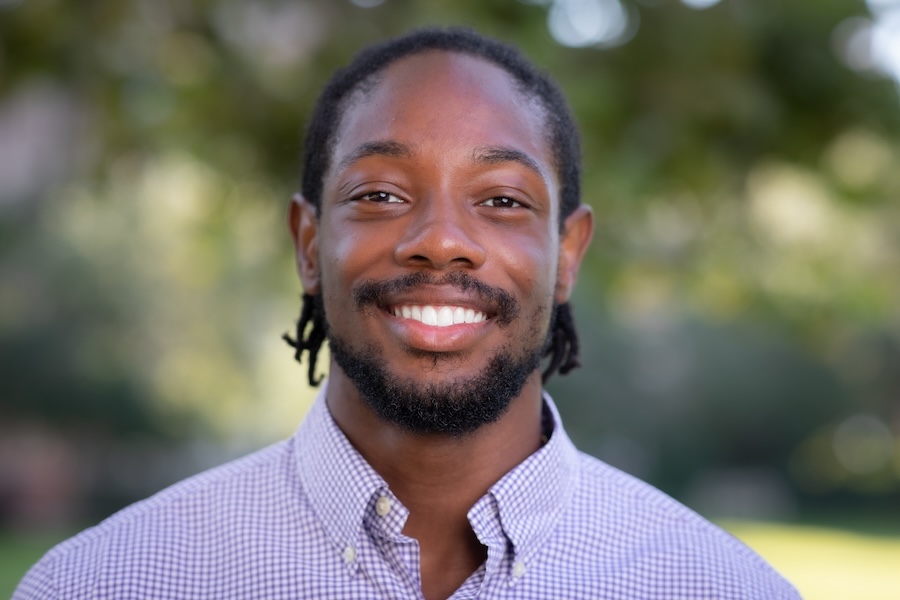Student Spotlight: Nath-Eddy Moody

Nath-Eddy Moody is a third-year doctoral student pursuing a degree in organic and materials chemistry through Florida State University’s Department of Chemistry and Biochemistry, part of the College of Arts and Sciences. His research involves synthesizing novel polymers from renewable resources, which has important applications for the plastics industry. In 2023, Moody won the Florida Education Fund’s McKnight Doctoral Fellowship, which addresses the underrepresentation of African American and Hispanic faculty at colleges and universities in Florida and throughout the country by supporting new students with up to five years of funding. This year, Moody won a Best Poster Award at the Centennial Poster Sessions hosted by the American Chemical Society’s Division of Polymeric Materials: Science and Engineering.
Tell us a little about your background, where you’re from and what brought you to FSU.
I’m from Orlando, Florida, and I earned my bachelor’s degree in chemistry from the University of Central Florida in 2021. I chose FSU because of the history and prestige of the Department of Chemistry and Biochemistry graduate program. Current and former FSU students carry themselves with a sense of pride and family. I know that no matter where you are, two strangers can easily become friends over a shared pride in their university.
What inspired you to pursue a degree in chemistry?
The more I learned about chemistry, the more passionate I became about it. I was inspired and genuinely interested in the reactions that fuel everything from cooking to renewable energy. This, combined with the support of everyone around me, made it easy to continue my education in chemistry.
What do you want the public to know about your research? Why are your topics important?
I research polymers, long chainlike structures built from molecular units called monomers. Some examples of polymers include plastic, DNA, and nonstick surfaces of cooking pans. Polymers are like Lego bricks, where each individual piece is a monomer; but when Legos snap together, you create a structure. If you add on different Legos, just like polymers adding different monomers, you get a different type of structure. Polymers permeate every aspect of life – they’re something that we can’t live without. I focus on the synthesis of polymers from renewable sources as we transition to greener chemistry.
Tell us about earning the McKnight Doctoral Fellowship. What does earning this fellowship mean to you?
It wouldn’t have been possible without Adrienne Stephenson, director of the Office of Graduate Fellowships and Awards and associate dean of FSU’s Graduate School. Stephenson, who also serves as the university liaison for the fellowship, served as a guiding hand through the process. It’s an honor to be a recipient of such a fellowship, represent my community, and further myself professionally in this way. The additional funding has also been a substantial help in allowing me to dedicate more time to research, which makes the doctoral process less stressful.
Tell us about winning the Best Poster Award from PMSE and what made your poster stand out.
It was a pleasant surprise, and I must thank associate professor of chemistry and biochemistry Justin Kennemur for his advice. The structure of your poster is the foundation of your presentation in displaying the entirety of your research. Having a poster that allows people of various disciplines to follow your process, ask questions, and leave with a general understanding is important. You should also convey your passion to those listening because if you excite the people you're talking to, you’ll leave an impression.
What aspect of your areas of study do you find most rewarding?
Watching my research progress step by step feels like a win until I reach my goal of a publication. It feels great to clear each hurdle, even the small ones.
Why did you join FSU’s Kennemur Group? What’s been your biggest takeaway from it?
I joined Professor Kennemur’s polymer chemistry research team, the Kennemur Group, because the work is an interesting blend of organic and material chemistry. In this group, we look to nature for inspiration in developing more sustainably sourced monomers. Kennemur also has an amazing personality, and I enjoy working with him. The bond with your principal investigator is as important as the work you do — if you can find both, then you’ve hit the jackpot.
What are some current goals or projects that you’re working on?
Our goal is to leverage nature’s ability to form molecules of unique composition and connectivity in abundance to create greener polymers. We’re synthesizing a biomass polymer from pine sap to create a biomass polymer that complements what’s commercially available, polylactic acid, or PLA, polymer. While PLA is a biodegradable plastic, it can’t withstand high temperatures. Our polymer has the potential to withstand higher temperatures without deformation and even reduce use of polystyrene, the current petrochemical polymer used for heat-resistance.
With the abundance of pine sap produced as a byproduct of the processing of lumber, there’s a unique opportunity to generate a highly applicable material at a low cost with high value. The synthesis of the polymer was the first step, and now I’m working on a full analysis of its material properties.
Following your graduation, what are your plans? Even though you might miss FSU, what are you looking forward to once you graduate?
I hope to continue working with polymers, particularly sustainable polymers, and I hope to travel. I love FSU and will be sure to come back for football games.
What advice do you have for fellow graduate students? What advice do you have for undergraduates?
Some people will be better at things than you, but the deciding factor will always be how hard you’re willing to work for what you want. In most situations, hard work can compete with talent — even if you must put in twice the amount of work, it’s okay because you finish all the same. If you truly want to reach your goals, learn to love the process and don’t get discouraged.
